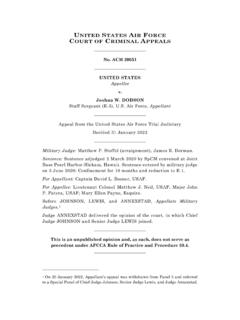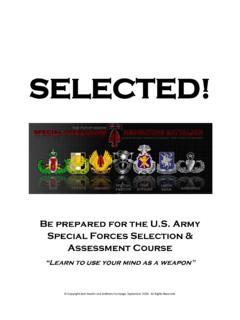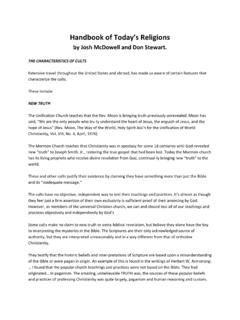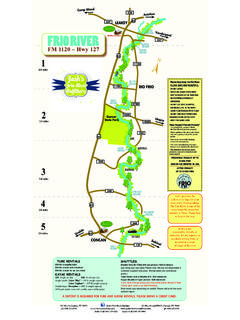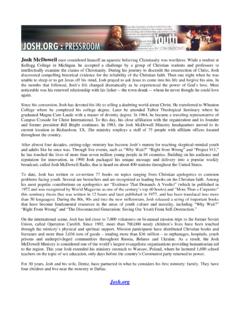Transcription of UNITED STATES AIR FORCE COURT OF …
1 UNITED STATES AIR FORCE COURT OF CRIMINAL APPEALS UNITED STATES v. Airman First Class JOSHUA B. CHAPPELL-DENZER UNITED STATES Air FORCE ACM 38498 5 June 2015 Sentence adjudged 23 August 2013 by GCM convened at Travis Air FORCE Base, California. Military Judge: W. Shane Cohen, William C. Muldoon. Approved Sentence: Dishonorable discharge, confinement for 10 years, forfeiture of all pay and allowances, and reduction to E-1. Appellate Counsel for the Appellant: Major Jeffrey A. Davis; Appellate Counsel for the UNITED STATES : Major Daniel J. Breen; Captain Thomas J. Alford; and Gerald R. Bruce, Esquire. Before MITCHELL, TELLER, and CONTOVEROS Appellate Military Judges OPINION OF THE COURT This opinion is issued as an unpublished opinion and, as such, does not serve as precedent under AFCCA Rule of Practice and Procedure MITCHELL, Senior Judge: A general COURT -martial composed of officer and enlisted members convicted the appellant, contrary to his pleas, of rape, aggravated sexual assault, abusive sexual contact, forcible sodomy, and assault consummated by a battery, in violation of Articles 120, 125, and 128, UCMJ, 10 920, 925, 928.
2 The adjudged and approved sentence consisted of a dishonorable discharge, confinement for 10 years, forfeiture of all pay and allowances, and reduction to E-1. Before us, the appellant asserts nine alleged errors: (1) the military judge erroneously denied two challenges for ACM 38498 2 cause, (2) the military judge abused his discretion in permitting the prosecution s expert witness to bolster the victim s testimony and profile the accused, (3) the military judge erred when he dismissed a member during deliberations on findings, (4) the military judge erred when he did not grant a mistrial after dismissing a member during deliberations, (5) the military judge abused his discretion by allowing trial counsel to testify during cross-examination of the appellant s expert witness during sentencing and then failed to instruct the members regarding trial counsel s statements, (6) trial counsel s sentencing argument was improper because it included facts not in evidence, (7)
3 His trial defense counsel were ineffective by failing to prepare the expert witness, (8) his trial defense counsel were ineffective by failing to challenge the results of the Rule for Courts-Martial 706 ( ) inquiry, and (9) cumulative error calls into question the fairness of his We disagree and affirm. Background The appellant was a 23-year-old male with over three years time in service. He met 19-year-old SrA MI while on duty at Travis Air FORCE Base, California, and they decided to date. Over the first week, they went on two dates involving dinner and a movie. On the third date, SrA MI spent the night in the appellant s dorm room. After kissing and expressly telling the appellant she was not going to have sexual intercourse with him, she fell asleep fully clothed. Twice during the night, she awoke to the appellant, who had unbuttoned her clothing, placing his fingers inside or near her vagina.
4 Both times she told him she did not approve, and he offered excuses. Two nights later, SrA MI decided to engage in sexual activity with the appellant. They agreed on a safety word to indicate a stop to the sexual activity. SrA MI and the appellant engaged in a variety of consensual sexual activities. Then the appellant held her arms above her head, pinned her body to the bed with his body weight, and engaged in vaginal intercourse with her that she found to be painful. She told him the safety word, but he ignored it. He continued to engage in intercourse despite her struggling, saying the safety word, and telling him no. She fell asleep in the appellant s bed and awakened to him kissing her on the neck, after which he engaged in anal intercourse with her. She pushed him away and then fell back asleep. She later awakened to the appellant having anal intercourse with her, and again, she pushed him away.
5 Two days later she ended their relationship by text message. After having a nightmare about the appellant raping her, she reported the earlier assaults. SrA TP, a friend of SrA MI who was aware of appellant s conduct, became concerned that a young woman he had just met had also dated the appellant. SrA TP met Ms. CF through a web-based dating service, OK Cupid. During the course of their date, they discussed prior relationships. Ms. CF described an individual who sounded like the appellant, so SrA TP asked her if the appellant was the person she had dated. After 1 The first, seventh, and eighth issues are raised pursuant to UNITED STATES v. Grostefon, 12 431 ( 1982). ACM 38498 3 Ms. CF said he was the appellant, SrA TP provided her contact information to the Air FORCE Office of Special Investigations (AFOSI) and later escorted her to their office to be interviewed.
6 At the time she made her statement, Ms. CF did not know SrA MI or the details of the investigation. However, she assumed the appellant was being investigated for rape because of her prior experiences with him. Twenty-year-old Ms. CF had met the appellant through OK Cupid. After texting and exchanging messages, Ms. CF and the appellant met in person, and he took her to his dorm room to watch a movie. They kissed, cuddled, and engaged in consensual intercourse, after which she fell asleep. She awakened to the appellant having sexual intercourse with her. After he ejaculated, he explained he was punishing her for snoring and waking him up. After this first date, they continued to have a relationship. On a night in October, Ms. CF was watching television with the appellant in his dorm room. After a repeated struggle while he tried to pull down her pants, the appellant held her hands over her head, pushed her legs apart, and had sexual intercourse with her while telling her to stop being so difficult.
7 Ms. CF cried afterwards but did not report this incident. She continued to be involved with the appellant. In late October or early November, the appellant asked Ms. CF to visit him. She was helping a friend so she told him he needed to wait. About an hour later, Ms. CF arrived at the base. The appellant was angry and told her she needed to be punished. He proceeded to have sexual intercourse with her while telling her if she made too much noise, was difficult, or resisted, he would have anal intercourse with her whether she wanted to or not. Ms. CF was scared by the appellant s threats, his demeanor, and his actions. Again she cried afterwards but did not report the incident because she was embarrassed. Ms. CF later ended their relationship. Ms. GG was 20 years old when she met the appellant through OK Cupid.
8 They exchanged text messages and went on a few dates. They also engaged in consensual sexual activity. In October 2011, Ms. GG was visiting the appellant in his dorm room. He asked her to perform oral sex on him, and she refused. The appellant then pushed her down, grabbed her head and, despite her resistance, forced his penis into her mouth. Later that night, they engaged in consensual vaginal intercourse. Again in November 2011, the appellant grabbed Ms. GG s head and forced her to perform oral sex on him after she had declined. They stopped dating, but Ms. GG decided to visit him again. While in his dorm room, the appellant tried to kiss her and to unbutton her pants, and Ms. GG told him to stop each time, which he did. Despite her earlier protestations, the appellant forced his hand inside her pants and touched her vagina.
9 At this point, Ms. GG emphatically told him she would not engage in sexual activity with him and left. Ms. GG knew neither SrA MI nor Ms. CF. ACM 38498 4 Challenge for Cause The appellant argues the military judge erroneously denied a challenge for cause against Lieutenant Colonel (Lt Col) JB for both actual and implied bias because her sister was a victim of a sexual assault while she was a cadet at the Air FORCE Academy. Lt Col JB explained that in 1996 a football player on the Air FORCE Academy s team entered her sister s dorm room and fondled her while she was asleep. Her sister reported the incident, and the perpetrator was administratively disciplined and removed from the football team. Her sister graduated in 1998, and they have not talked about the incident since then. Lt Col JB explained her sister was satisfied with how it was handled and had moved on from the assault.
10 The appellant also argues the military judge erred when he denied a challenge for cause for implied bias against Staff Sergeant (SSgt) EV. SSgt EV volunteered with the on-base victims advocate group in 2007. She received three days of training and then served with the group for at most a year. During that time, she was on-call for one week but never was assigned to a victim. She explained she volunteered because she liked to help people and it would be a good enlisted performance report input. Rule for Courts-Martial 912(f)(1)(N) provides that a member shall be excused for cause whenever it appears that the member [s]hould not sit as a member in the interest of having the COURT -martial free from substantial doubt as to legality, fairness, and impartiality. This rule encompasses challenges based upon both actual and implied bias.


